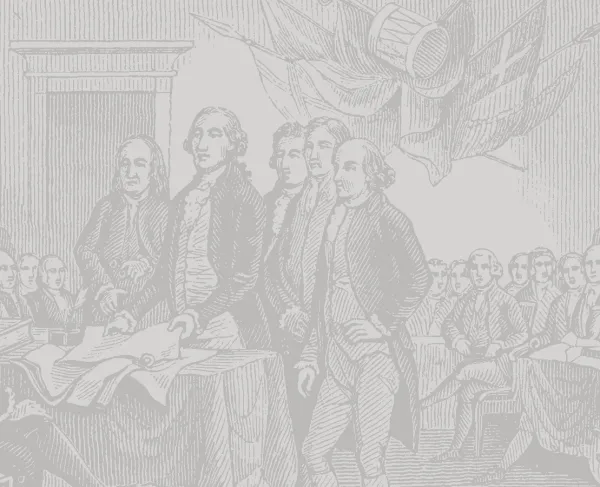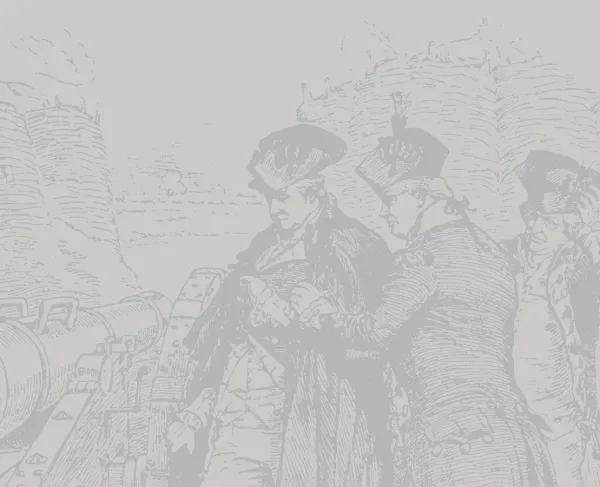An Answer to the Declaration of the American Congress

In 1776, John Lind wrote a pamphlet arguing against the Declaration of Independence and laying out political and social philosophies opposing it. Lind, a British barrister and political activist, wrote many pamphlets. His work, "An answer to the Declaration of the American Congress," ran for more than 100 pages, refuting the concept of natural laws and natural rights.
Here is the introduction to Lind's answer, and the word emphasis throughout the text is original:
INTRODUCTION
Ill would it become the dignity of an insulted Sovereign to defend to altercation with revolted subjects. — This would be to recognise that equality and independence, to which subjects, persisting in revolt, cannot fail to pretend. —Ill would it become the policy of an enlighten Sovereign to appeal to other state on matters relating to his own internal government. —This would be to recognise the right of other states to interfere in matters, from which all foreign interposition should for ever be precluded.
To these considerations it is, we must attribute the neglect with which the Declaration of the American Congress has been treated by the Government of Great Britain. Easy as it were, and fit as it may be, to refute the calumnies contained in that audacious paper, it could not be expected that his Majesty or his Ministers should condescend to give it any answer.
But that answer, which neither a sense of dignity, nor principles of policy, will allow the Sovereign to give, may yet be furnished by the zeal of any well-affected subject.
For, after all, what are the Members of this mighty Congress/ With whatever titles they may dignify their selves, in respect to us at least, they are but simple individuals.
Were they more, yet, in this country, the measures even of Government are open to the examination of every subject. The right of censuring what they disapprove, the partisans of American have exercised and still exercise, without scruple and without shame. They will not surely deny to me the right of defending what I approve. Here at least they will not be backward in acknowledging, that it is no mean advantage, which we derive from the happy form of our Constitution, that private individuals are competent to those tasks, which, under more jealous governments, can be executed only by officers commissioned for the purpose. Here at least they will allow that an insult offered to every man may be repelled by any man.
And surely the Declaration of the American Congress is an insult offered to every one who bears the name of Briton. For in considering the present contest between Great Britain and America, it is a truth which deserves our peculiar attention, and while therefore cannot be too often repeated, nor too throughly inculcated, that the dispute is not nor ever has it been, between his Majesty and the whole, or any part of his subjects. The dispute is clearly between one part of his subjects and another. The blow given by the Congress appears indeed to be levelled at his Majesty's but the wound was intended for us.
For let us separate in idea, so far as they can be separated, the interests of the King from those of subjects: And let us, for the sake of argument, suppose—what I trust we shall hereafter most fully disprove—that the present contest took its rise from a claim set up by Parliament to the exercise of unconstitutional, unprecedented power over the Colonies: What in this case had his Majesty to gain by supporting the claim of Parliament? How would he have advanced any separate interest by it. Was it by an accession of new power? Was it by an acquisition of new revenues? By one or other of these, if by any way, must he advance his own separate interest.
There are but two ways in which the King could acquire new power. Either he must assume to his self the exercise of those powers, which are now exercised by the other constituent branches of the sovereignty; of he must take off the restraints, un which he exercises the powers he already has. Far, I am sure, is it beyond my ken of my discernment, to discover how, by increasing the power of Parliament,— and by this supposition the power of Parliament was to be increased—his Majesty was to be enabled, or should have expected that he would be enabled, to seize into his own hands the powers which were exercised or take off the restraints imposed, by that very Parliament.
Was it an acquisition of new revenues, which his Majesty could propose to his self by the success of this contest? Surely not. Whether his British subjects continued to bear—as hitherto they had borne—almost the whole of the common burdens of the state; Or whether his American subjects contributed a part,—and a small part only was expected—of their proportion, would have made no alteration in the state of his revenues. Were the Americans to pay what was demanded—supporting always the Parliament alone to assess the proportion to be paid by the British and American subjects—he would not receive more:—Were they not to pay, he would not receive less.
In the event therefore of this contest—let us gain repeat it—not the separate interests of His Majesty, but but those of his British subjects are involved. If the Americans insult him by groundless complaints of his government, it is because he asserted our rights: if they have dared to renounce all allegiance to his Crown, it is because he determined not to give up our rights.
The general charge brought against his Majesty, in this audacious paper, is, that "the history of his reign is a history of repeated injuries and usurpations; all having in direct object the establishment of an absolute tyranny over"—what they call—"these states,"—what we should call—his Majesty's subjects in America.
In support of this atrocious charge certain maxims are advanced; a theory of Government is established; and what the Authors of the Declaration call Facts, are submitted, as they tell us, to "the candid world."
These maxims, this theory, and these facts we are now about to examine. We shall begin by the facts. And to state them more clearly, the several charges are numbered; and divided into so many separate Articles. They are given in the order in which they stand in the Declaration; and each considered apart. But as there is a studied confusion in that arrangement, it was thought right to subjoin a short, but general, Review of the whole; in which the maxims and the theory are examined; and the grievances alleged are classed under their respective heads. And under certain heads the Congress would no doubt have classed them; if conscious of the futility of the charges, they had not fled to the mean resources of endeavouring to supply by numbers, what they wanted in weight; to confuse where they could not hope to convince.
Much merit seems to have been assumed by the Authors of the Declaration on account of the "attention," which they profess to have shewn to us, whome for this last, as they inform us, they style—"their British brethren:"—of the "warnings," they have given us:—of "their appeals to our native "justice and magnanimity." And to do them justice, some art there was in the steps by which they endeavoured to make us their dupes; the blind instruments of procuring them that independence, at which they so long have aimed. —Their first attacks were cautious; the Ministry only were to blame: To rail at Ministers, is always popular. The King was deceived; the Parliament misled; the nation deluded. —In a little time they saw that Parliament was neither to be frightened, nor argued into a resignation of its just authority; and then Parliament came in for its share of culpability. It encroached on the rights of the American Assembles. For they too, all at once, were become Parliaments; Still the King was their common Father; the nation, their brethren.—Yet a little while and they saw, that the King was not to be persuaded to listen to the deceitful voice of faction, in preference to the sober advice of the great, constitutional Council of the nation; and then the King ceased to be their father; Still the nation were their brethren, their friends: So late even as the preset year, when war was declared against the bulk of the nation, there remained yet many of them friends; entitled to "applause and gratitude for their patriotism and benevolence." —At last they perceived that those friends could not serve the turn expected of them; could no more misguide the nation, than deceive the King and Parliament: And now King, and Parliament, and nation, and patriots, and friends, are all involved in one common accusation; all pointed out as objects of one common odium. Still however they regret, and feelingly no doubt, that neither warnings, "nor appeals," nor "conjurations," have excited us to "disfavor" what they stigmatise as "unwarrantable jurisdiction;" Acts of "usurpation"—to listen to what they call "the voice of justice and consanguinity." That is, in other words, they regret most heartily, that neither they, nor their emissaries, have been able to prevail with us to join in their rebellion. Their hopes peradventure had been sanguine; their disappointment therefore may be severe. They appealed to the passions: But they had forgotten, it should seem, that there is another appeal, to which, sooner or later, Britons do not fail to listen—An appeal to good sense.
To the good sense of my countrymen I venture to appeal. To that good sense with confidence do I submit the following Answer to the Declaration. Honest, I am sure, it is; I trust, not inadequate. Were the charges of "unwarrantable jurisdiction," of "tyranny," of "usurpation," so boldly urged as against our rulers, supported by proof, I should readily allow it to be the duty of every man to unite in procuring redress to injured subjects: But if it appear—and I trust it will appear—that the charges are unsupported, even by the shadow of a proof, let it in return, be allowed to be the duty of every man to unite in reducing rebellious subjects to a due obedience to law.
Happy should I be, could I suggest new motives to my fellow-subjects of Great Britain, for submitting with cheerfulness to the burdens which must be borne, for concurring with zeal in the measures which must be adopted, to effectuate this important object.
Happy should I be, could I contribute to efface any stain, which the false accusations of the rebellious Congress, may have thrown on the character of a Prince, so justly entitled to the love of his subjects, and the esteem of foreign nations.
Happy should I be, were it possible to induce this deluded people to listen to the voice of reason; to abandon a set of men who are making them stilts to their own private ambition; to return to their former confidence in the King and his Parliament, and like the Romans, when they threw off the yoke of the Decemvirs:—"Inde libertatis captare auram, unde fervitutem timendo Rempbulicam in cum flatum perduxere."
Source and complete pamphlet: Public Domain through Hathitrust





